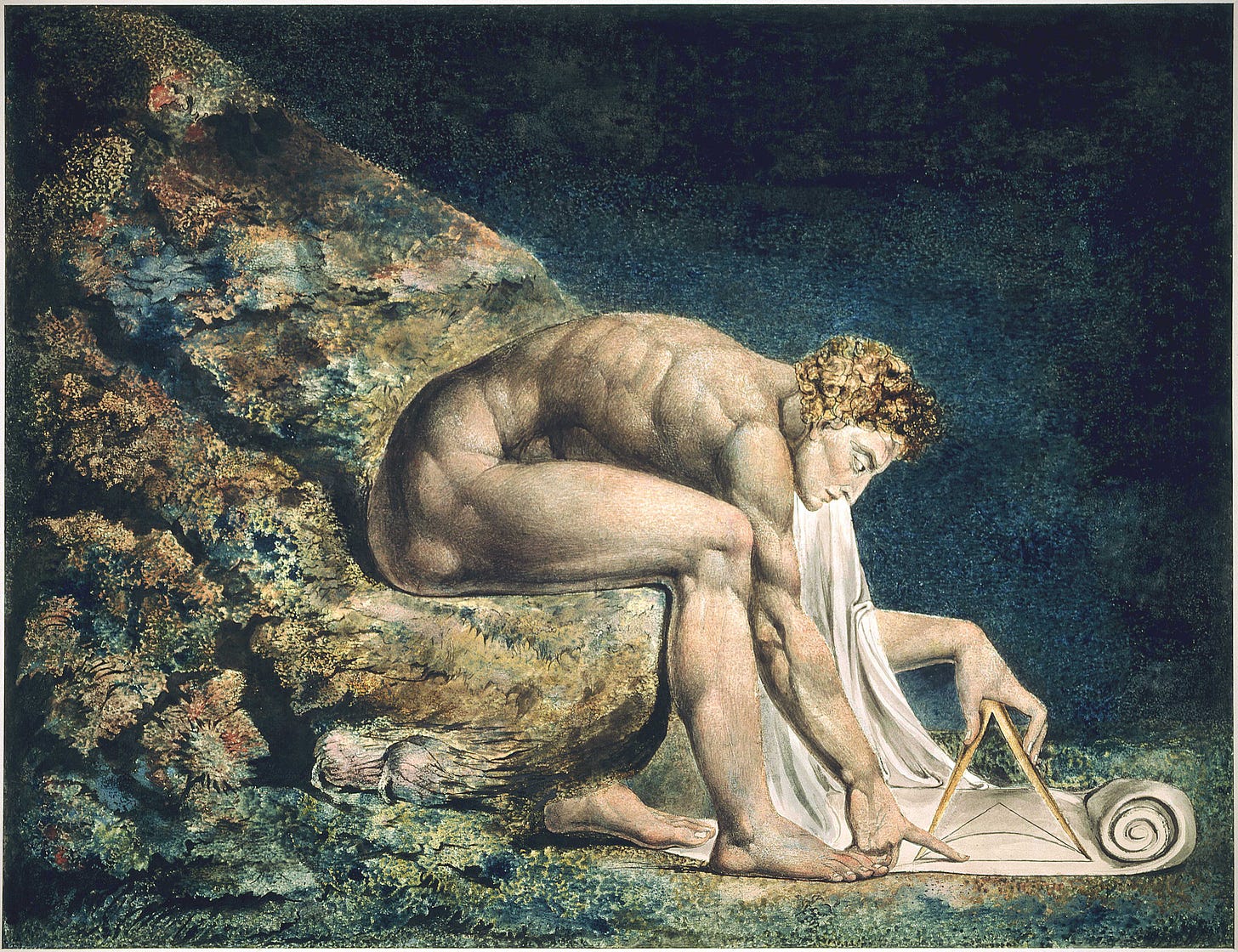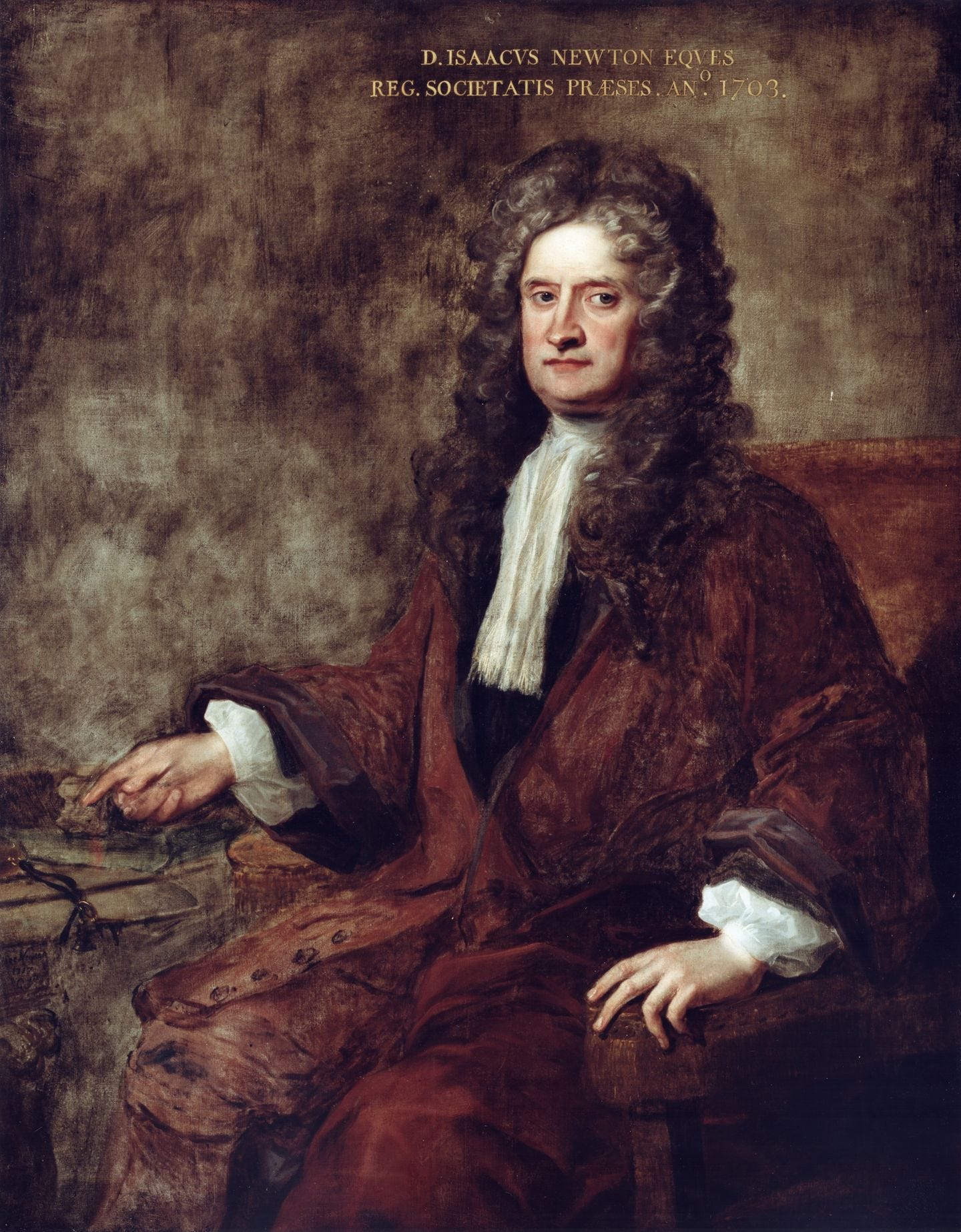I know history can be taught in such a dense and boring way but hear me out for a second because I found what I am about to share with you absolutely fascinating.
Take a look at this painting. What do you see?
This is a painting by William Blake from 227 years ago and it’s a window into what was happening at the time.
What you see here is a depiction of the Isaac Newton, seated on some kind of mossy, rocky outcrop that could very well be the ocean floor. It is vibrant with color and detail, almost to the point where it actually looks like it is alive. Wherever he is, it’s mysterious.
Newton himself is nude, and his body is sculpted – he looks more like a Greek statue than a 17th century mathematician.
Ah, but of course this is on purpose. If Newton looks a little unfamiliar in this painting, it is because the actual Newton looked nothing like this. There is no historical evidence that Newton was fit or muscular in any way, never mind to this extent. He was prone to illness. The man actually looked like this:
This portrayal of Newton is ironic. Blake is making a brilliant criticism of The Enlightenment. Can you guess what it is? I’ll give you a hint: we’re looking at a beautiful man utterly unaware of the gorgeous world around him. Instead he is bent over, fully absorbed in drawing geometry on a scroll with the tool in his hand. What exactly is the problem here?
Let’s be reasonable
I find it astounding how much society is a mirror of the individual. If you look at history, you can learn so much about the human psyche.
When this painting was made in 1798, the West was at a crossroads between one major movement and another. The Enlightenment, a European intellectual movement that championed reason and rational thought, was beginning to wind down after dominating the 18th century.
As I’m discovering is always the case, it was a reaction to the world that came before it: a world dominated by centuries of religious dogma, superstition & authoritarian rule. Feudalism, if you are unfamiliar, is like a medieval version of the worst pyramid scheme you’ve ever heard of.
Everything was a complete rip-off. I imagine elites got away with this for a long time because most people have very little access to education.
Enlightenment thinkers had a, “we’ve had enough of this shit” attitude and boldly challenged the idea that truth could only come through scripture and the Church. Instead, the thinking went that if we used our minds and the tools at our disposal, we could do all kinds of stuff. We could explain the natural world, improve society and politics and liberate people from ignorance and tyranny. Through this lens, it’s hard to argue that The Enlightenment wasn’t a massive upgrade on what came before.
But when Enlightenment thinkers threw out the rigidity of dogmatic religion, they kind of threw out spirituality as well. A baby with the bathwater sort of situation. Enlightenment thinkers didn’t straight-up reject emotion, art or spirituality, that would be far too black and white. They just didn’t see those things as reliable foundations for truth. So they became more of an after thought. All that seemed to matter was what you can measure.
After a while of this “age of reason,” it really felt like something was missing, something had been lost. So much measuring, so little feeling. Also, The Enlightenment’s promise of progress and utopia wasn’t panning out so well.
Instead, industrialization brought pollution, horrific factory labor and disconnection from nature. The French Revolution brought on the Reign of Terror. Don’t even get me started with Colonialism. The word “progress” was proving to be a powerful and dangerous marketing tool to get away with all kinds of atrocities.
A new cultural and artistic movement was gaining steam in response to this cold and spiritually impoverished world of reason and rationalism: Romanticism. Romanticism flipped the script in many ways, prioritizing feeling over reason, nature over industry, imagination over logic.
Blake’s painting is about missing the point. Newton is so caught up in his mathematics that he has lost sight of the mystery of the world around him. In Blake’s view, Newton was not a villain, he was simply mentally imprisoned. Caught up on all the wrong things.
But of course, this is hard to say to someone who’s had censorship and faith crammed down their throat! It is difficult to be balanced and not overcompensate when you have such a traumatic past.
Blake felt the Enlightenment was about imposing scientific reason onto a world that is far richer than we could ever calculate. In his words:
“If the doors of perception were cleansed, everything would appear to man as it is: infinite.”
Is any of this sounding familiar to you? Hopefully at least a little bit. Today and forever that battle between rational and emotional rages on. We keep plowing forward in the name of “progress” without knowing what we’re playing with. Increasingly, tech is seen as the only thing that can “save” us, the only thing that can solve the problems that tech has created.
Amongst the many things that concern me is that the people developing these technologies, our tech CEOs, the people in charge of regulation, they all appear to lack the emotional intelligence I think we’re going to need to handle this.
As I read and learn more deeply about history, I’m realizing that the past is nowhere near as disconnected or irrelevant to today as it can sometimes feel. Just replace the scroll that Newton is staring at with ChatGPT open on a smartphone and boom you’re in 2025.
I don’t want to demonize The Enlightenment. I think humans are very good at making really powerful tools and it’s fun (and lifechanging!) to use those tools. Here I am writing this on a laptop that I love to use and in a matter of minutes, I’ll blast this out to the world to be read by people I’ve never met on continents I’ve never been to. It’s miraculous.
But it does feel to me like The Enlightenment began to go wrong when it went beyond just questioning the established truths of the past and tried to entirely remake the world. When it said “This is it! We have found the Truth!” in a way that reeks of arrogance. And arrogance never leads anywhere good, it never ends well. This is what happens when we spend too much time in our heads.
We All Have a Rationalist & a Romantic Within Us
I write about this because when I began learning about this, I could not stop thinking about how well this maps onto my own life.
The way I see things, I am equipped with 2 main tools that assist me as I navigate life as an adult and the responsibilities that come along with that (e.g. how to make a living, feed yourself, perhaps feed a family).
The more tempting of these tools is my mind. My mind is very useful for many things, but I find that if I let it run unchecked, it generates all kinds of unhelpful thoughts. It offers a false kind of safety and security in its calculations. So many of my thoughts are rooted in fear or in a sense of lack or urgency. They always seem oriented towards solving problems, treating life as a series of calculations.
There is a kind of coldness to this way of living. It does not make the world feel like an expansive place. It crowds out the possibility to wonder, and there is a real cost to this way of operating that I think many people were feeling right around the year 1800. And I think a lot of people are feeling it today.
The other option, the other tool I’m always trying to get better at using, is my heart. To even call it a tool doesn’t quite sound right, but it actually can be used as a compass, as a way to make decisions. It is a doorway into feeling, into playfulness. I write so often about the heart because I see it so rarely written about online. We’re all looking for tips and hacks and improved strategies but I’m tired of that stuff. It feels empty to me. I want to have the humility to accept that the world operates in ways I cannot measure. For some reason, this way of operating requires much more focus and intention, it has less of the easy allure of the mind, but it is a far lighter and more joyous way to go through life. And that’s what I want.
It’s not about letting your whole life be ruled by emotions. It is about not letting your whole life be ruled by cold, calculating thought.
This is yet another reason why children play such an important role for our species: they’re a constant reminder that this is an important and valuable way to go through life. To not get too far into your head.
Of course, we cannot live with 100% of the whimsical carefree energy of a small child. But in so many situations I find I can pick between these two main tools at my disposal and the heart approach has yet to let me down.
We forget that we so easily build entire worlds in our minds in our attempts to run from the things that terrify us. Cold calculated thinking is very different than imagination. This kind of thinking is replete with thinly veiled strategies to get away from danger. If I can solve all the problems, I can avoid disaster! The great danger of the mind is it’s certainty. It generates problems that it can then solve. It will tell you: “I’m stuck! We are doomed! I am not enough! There is no way out! No one loves me! I have to solve this!!!”
In the spirit of Romanticism, the more an answer seems certain, the more I invite you to question it. There is much we do not understand with our brains, and there’s a beautiful richness that I feel when I embrace that uncertainty. Don’t let your mind fool you into thinking you can figure it all out. Or even that you need to figure it all out. That is a terribly boring way to live. I happen to agree with William Blake: to measure the world is to miss the point.
More to come soon. ;)
If you enjoyed reading, and want to see behind the scenes of how these concepts are making their way into a book I am working on (along with other subscriber-only benefits), consider upgrading. Thank you for supporting my work!





Hi:)
Personally, I think this is your best essay so far, definitely one of my favourites.
What I find curious is that nowadays, whenever I come across the word enlightenment, it seems to carry a very different meaning from what it once held during the Enlightenment era.
I’m particularly drawn to the themes of mindfulness and enlightenment, especially as explored in the books of Eckhart Tolle. In his work, he describes enlightenment as the very opposite of rationality and mind-centred thinking. He says that if you're actively seeking enlightenment, you'll never find it because it's not something you can look for. It’s something you have to feel.
I agree with Eckhart and with you. Enlightenment isn’t about rationalising, or being in your mind, or trying to make sense of everything. True enlightenment is about recognising what is, rather than what we think it is.
"I want to have the humility to accept that the world operates in ways I cannot measure."
this line hit me deep. Loved reading this essay Nathaniel